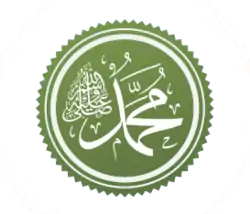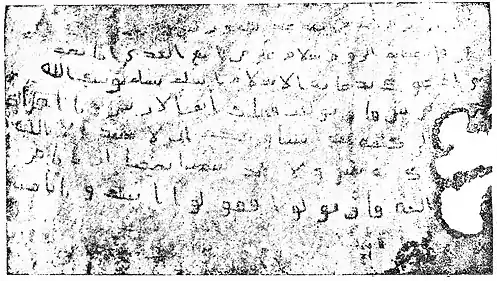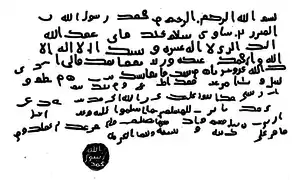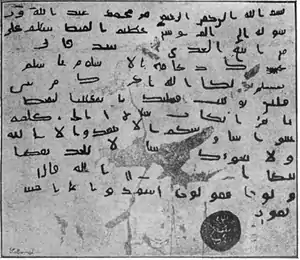Muhammad's letters to the heads of state
Muhammad's letters to the heads of state are letters sent by Muhammad to many rulers of the world. According to al-Tabari in his History of the Prophets and Kings (10th century CE), Muhammad decided after the Treaty of Hudaybiyyah (628) to send letters to many rulers of the world, inviting them to Islam.
[1][2][3]
| Part of a series on |
| Muhammad |
|---|
 |
|
Muhammad, according to Islamic historiography, sent ambassadors with such letters to Heraclius the Roman Emperor, Chosroes II the Khosrau of Persia, Armah the Negus of Abyssinia, Muqawqis the ruler of Egypt, Harith Gassani the governor of Syria, Munzir ibn Sawa and to the ruler of Bahrain.[4][5]
Letters
To the Sassanian Emperor
Islamic tradition tells a story in which Khosrow II (in Arabic: كسرى Transliteration: Kisra) was a Persian king to whom Muhammad had sent a messenger, Abdullah ibn Hudhafah as-Sahmi, along with a letter in which Khosrow was asked to preach the religion of Islam.[6][7] The account as transmitted by Muslim tradition reads:
"In the name of Allah, the Beneficent, the Merciful. From Muhammad, the Messenger of Allah, to Kisra, the great (leader/head) of the Persians. Peace be upon him, who seeks truth and expresses belief in Allah and in His Prophet and testifies that there is no god but Allah and that He has no partner, and who believes that Muhammad is His servant and Prophet. Under the Command of Allah, I invite you to Him. He has sent me for the guidance of all people so that I may warn them all of His wrath and may present the unbelievers with an ultimatum. Embrace Islam so that you may remain safe (in this life and the next). And if you refuse to accept Islam, you will be responsible for the sins of the Magi."[7][8]
Islamic tradition further states that Khosrow II tore up Muhammed's letter[9] saying, "A pitiful slave among my subjects dares to write his name before mine" [10] and commanded Badhan, his vassal ruler of Yemen, to dispatch two valiant men to identify, seize and bring this man from Hijaz (Muhammad) to him. When Abdullah ibn Hudhafah as-Sahmi told Muhammad how Khosrow had torn his letter to pieces, Muhammad promised the destruction of Khosrow II, stating, "Even so, Allah shall destroy his kingdom."[9]
To the Roman Emperor

The text of the letter to Heraclius, as transmitted by Muslim historians, reads as follows:[11]
من محمد بن عبد الله إلى هرقل عظيم الروم: سلام على من اتبع الهدى، أما بعد فإنى أدعوك بدعوة الإسلام . أسلم تسلم ويؤتك الله أجرك مرتين ، فإن توليت فإن عليك إثم الأريسيِّين.
{قُلْ يَا أَهْلَ الْكِتَابِ تَعَالَوْا إِلَىٰ كَلِمَةٍ سَوَاءٍ بَيْنَنَا وَبَيْنَكُمْ أَلَّا نَعْبُدَ إِلَّا اللَّهَ وَلَا نُشْرِكَ بِهِ شَيْئًا وَلَا يَتَّخِذَ بَعْضُنَا بَعْضًا أَرْبَابًا مِّن دُونِ اللَّهِ ۚ فَإِن تَوَلَّوْا فَقُولُوا اشْهَدُوا بِأَنَّا مُسْلِمُونَ} [سورة آل عمران : 64].
In the name of God, the Most Merciful, the Bestower of all Mercy
From Muhammad, Worshiper and Messenger of Allah to Heraclius the Great of the Romans:
Peace be upon he who follows the guidance.
Furthermore, I invite you with the invitation of peace. If you submit then you will find safety and God will double your reward. If you turn away, you will bear the Arians’ sins.
"O People of the Scripture! Come to a common word between us and you: that we shall worship none but God, and that we shall ascribe no partner unto Him, and that none of us shall take others for lords beside God. And if they turn away, then say: Bear witness that we are they who have surrendered (unto Him).
— Quran, Chapter: Aal Imran “The House of Joachim” 3:64
To the King of Ethiopia
Letter of the Prophet Muhammed to Armah, the Negus:
كتاب رسول الإسلام صلى الله عليه وسلم إلى النجاشي
بسم الله الرحمن الرحيم من محمد رسول الإسلام إلى النجاشى ملك الحبشة: سلام عليك إنى أحمد الله إليك ،الله الذي لا إله إلا هو الملك القدوس السلام المؤمن المهيمن، وأشهد أن عيسى بن مريم روح الله وكلمته ألقاها إلى مريم البتول الطيبة الحصينة، فحملت بعيسى فخلقه الله من روحه كما خلق آدم بيده، وإنى أدعوك وجنودك إلى الله عز وجل، وقد بلغت ونصحت فاقبلوا نصحى، والسلام على من اتبع الهدى
Letter of the Prophet of Islam, peace be upon him. In the name of God the most beneficial the Merciful. Mohammed the Prophet of Islam to Nagaci king of Abyssinia:
Peace to you that I thank God for you, God, who there is no god but He, the King, the Holy peace insured dominant, and I bear witness that Jesus son of Mary, the Spirit of God and his speech was delivered to the Virgin Mary the good bunker. God created Jesus from his spirit, just as he created Adam with his hand, and I invite you and your soldiers to God Almighty, has reached and advised receive my advice, and peace be upon those who follow guidance.
To the Governor of Bahrain

Letter of the Prophet Muhammed to Munzir ibn Sawa Al Tamimi
رساله رسول الله صلى الله عليه وسلم محمد للمنذر بن ساوي التميمى
بسم الله الرحمن الرحيم، من محمد رسول الله إلى المنذر بن ساوي، سلام عليك، فإني أحمد الله إليك الذي لا إله إلا هو، وأشهد أن لا إله إلا الله، وأن محمداً عبده ورسوله. أما بعد: فإني أذكرك الله عز وجل، فإنه من ينصح فإنما ينصح لنفسه، ومن يطع رسلي ويتبع أمرهم فقد أطاعني، ومن ينصح لهم فقد نصح لي، وإنّ رسلي قد أثنوا عليك خيراً، وإني قد شفعتُكَ في قومكَ، فاتركْ للمسلمين ما أسلموا عليه، وعفوتُ عن أهل الذنوب فاقبل منهم، وإنك مهما تصلح، فلن نعزلكَ عن عملك، ومن أقام على يهودية أو مجوسية فعليه الجزية.
In the name of Allah the Beneficent, the Merciful: From Muhammad the Messenger of Allah to Munzir bin Sawa, may peace be on you! I praise Allah, who is one and there none to be worshiped but except Him. I bear evidence that there is no God but Allah and that Muhammad is a servant of Allah and His Prophet. Thereafter I remind you of Allah. Whoever accepts admonition does it for his own good. Whoever followed my messengers and acted in accordance their guidance; he, in fact,followed me and accepted my advice. My messengers have highly praised your behavior. You shall continue in your present office. You should remain faithful to Allah and his Prophet. I accept your recommendation regarding the people of Bahrain. I forgive the offenses of the offenders.
Therefore, you may also forgive them of the people of Bahrain whoever want to continue in their Jewish or Majusi faith, should be made to pay Jizia.
Seal: Muhammad, the Prophet of Allah[12]
To Muqawqis of Egypt

Letter of the Prophet Muhammed to the Muqawqis In the name of Allah the Rahman, the Merciful. From the Apostle of Allah to the Mukaukis, chief of the Copts. Peace be upon him who follows the guidance. Next, I summon thee with the appeal of establish peace (or submitting your will to Allah ): establish peace (submit your will to Allah) and you will have peace. Allah shall give you your reward twofold. But if you decline then on you is the guilt of the Copts. O ye people of the Book, come unto an equal arrangement between us and you, that we should serve none save Allah, associating nothing with Him, and not taking one another for Lords besides Allah. And if ye decline, then bear witness that we have submitted our will to Allah .[14]
To the Ruler of Oman
Prophet Mohammed’s Letter to the Ruler of Oman is displayed at the National Museum of Oman that often stirs emotions in people and because of its great significance, a sample of this article is exhibited in other museums as well. It is a letter written in Arabic using ink and used leather as a canvas and is believed by the museum to have been penned in 8 AH/630 CE. The document is a letter from the Prophet Mohammed (Peace be upon him) bearing his stamp to Abd and Jaifar, joint Kings of Oman at that time. The letter was sent through ‘Amr Ibn al-‘As to Jaifar and Jaffer ibn al Julanda.“The capital city then was Suhar. So this letter was sent asking the people of Oman to convert to Islam.” He mentioned in the letter, ‘Bismillahi Rehman Rahim, from Mohammed, the Prophet of Allah, I am asking you to convert to Islam and if you do your whole life in peace, but if you do not you will live in wars.’ So in response to the letter, Oman was the first country to convert to Islam without any war. It is said that the Prophet (peace be upon him) made a prayer for the Omani people that they will never have enemies from outside.” The letter is an important display at the National Museum at an area dedicated to the Islamic history of Oman.[15]
The letter reads as follows:
“In the name of Allah, the Beneficent, the Merciful. From Mohammed, the messenger of Allah, to Jaifar and Abd, sons of Al Julanda. Peace is upon him who follows the guidance. I am calling both of you, in the name of Islam. You will be safe if you submit to Islam.
I am the Messenger of Allah to all people warn all living that Islam will prevail. I hope you will accept Islam, but if you do not, then you will lose your country, and my horsemen will invade your territory and my prophecy will dominate your country”.
See also
References
- Lings, Martin (1994). Muhammad: His Life based on the earliest sources. Suhail Academy Lahore. p. 260.
- Khan, Dr. Majid Ali (1998). Muhammad The Final Messenger. Islamic Book Service, New Delhi, 110002 (India). pp. 250–251. ISBN 81-85738-25-4.
- Haykal, Muhammad Husayn (1993). The Life of Muhammad (Translated from the 8th Edition By Ism'il Ragi A. Al Faruqi). Islami Book Trust, Kula Lumpur. p. 360.
- For example, Sigismund Koelle reports that "Ibn Ishak also mentions the names of nine different messengers who had to carry Mohammed's letters to the following potentates: (1) to the Emperor of the Greeks; (2) to Chosroes, the king of Persia; (3) to Najashi, the prince of Abyssinia; (4) to Mokawkas, the prince of Alexandria; (5) to Jeifar and Iyaz, the princes of Oman; (6) to Thumama and Hawza, the princes of Yemama; (7) to Munzir, the prince of Bahrein; (8) to El Harith, the prince of the border districts of Syria; and (9) to the Himyarite Harith Ibn Abd Kulal, the prince of Yemen." Koelle, S. W. (1889). Mohammed and Mohammedanism Critically Considered (p. 194). London: Rivingtons.
- "In Pictures: Prophet Mohammed's letters that were sent to rulers". Al Arabiya English. May 14, 2017.
- al-Mubarakpuri (2002) p. 417
- "Chapter 42: The Events of the Seventh Year of Migration". Archived from the original on 5 August 2012. Retrieved 25 August 2013.
- Tabaqat-i Kubra, vol. I, page 360; Tarikh-i Tabari, vol. II, pp. 295, 296; Tarikh-i Kamil, vol. II, page 81 and Biharul Anwar, vol. XX, page 389
- Kisra, M. Morony, The Encyclopaedia of Islam, Vol. V, ed.C.E. Bosworth, E.van Donzel, B. Lewis and C. Pellat, (E.J.Brill, 1980), 185.
- Mubarakpuri, Safiur-Rahman. WHEN THE MOON SPLIT. Darussalam. ISBN 978-603-500-060-4.
- Reinink, G. J.; Stolte, Bernard H. (October 6, 2002). The Reign of Heraclius (610-641): Crisis and Confrontation. Peeters Publishers. ISBN 9789042912281 – via Google Books.
- Translation was copied and modified from some websites here , . It would be appreciated if there is a better translation.
- "the original of the letter was discovered in 1858 by Monsieur Etienne Barthelemy, member of a French expedition, in a monastery in Egypt and is now carefully preserved in Constantinople. Several photographs of the letter have since been published. The first one was published in the well-known Egyptian newspaper Al-Hilal in November 1904" Muhammad Zafrulla Khan, Muhammad: Seal of the Prophets, Routledge & Kegan Paul, London, 1980 (chapter 12). The drawing of the letter published in Al-Hilal was reproduced in David Samuel Margoliouth, Mohammed and the Rise of Islam, London (1905), p. 365, which is the source of this image.
- Margoliouth, D. S. (1905). Mohammed and the Rise of Islam (Third Edition., p. 365). New York; London: G. P. Putnam's Sons; The Knickerbocker Press.
- Ministry of Cultural Affairs of Sultanate of Oman - Advisor to HM the Sultan for Cultural Affairs The Letter of the Prophet Mohammad to the People of Oman - Advisor to HM the Sultan for Cultural Affairs